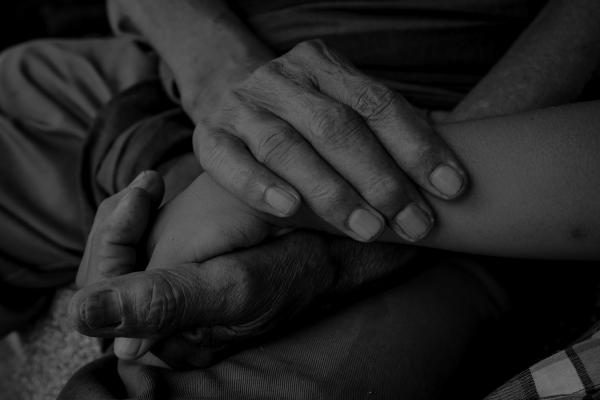“I will never talk to her ever again. I will never be able to hold her again. ...You hurt me. You hurt a lot of people. But I forgive you.”
Those words of accountability and forgiveness were spoken to Dylann Roof at his bond hearing by the family of one of his victims.
How are we to understand such radical forgiveness?
The spirit of forgiveness and accountability was on full display during the bond hearing by the family members of the victims. Understandably, many have seen that forgiveness as shallow, even calling it a “parade of forgiveness [that] is disconcerting to say the least.”
Forgiveness isn’t disconcerting. What is disconcerting is a hypocritical response from white America.
Many white Americans interpret black forgiveness as absolution for the racist attitudes that led to the attack. We distort that forgiveness in a way that doesn’t hold us accountable for changing the racist political, economic, and educational structures that infect our country.
If white America celebrates the forgiveness that was on display in Charleston but refuses to be transformed by it, then we are hypocrites. If that forgiveness doesn’t break our hearts to make them grow bigger, if that forgiveness doesn’t become a model for white America to follow, if that forgiveness doesn’t make us work for racial justice and make us more gracious and forgiving in our lives, then we are just a bunch of hypocrites.
When we celebrate black forgiveness but refuse to be accountable to that very forgiveness then we are doing nothing more than creating an aura of deniability. By celebrating black forgiveness of those persecutors like Dylann Roof, we can safely deny that we participate in and benefit from racist structures that persecute black people. In other words, we can so twist the blessed act of forgiveness that we manipulate it to deny that we are persecutors, too.
In her Washington Post article, Stacey Patton speaks to the hypocrisy of white America. We celebrate and even demand black forgiveness in the face of violence, she writes, but we do not offer our own forgiveness to violence committed against us. She connects this to the terrorist attacks of September 11, 2001.
“After 9/11 there was no talk about forgiving al-Qaeda, Saddam Hussein, or Osama bin Laden. America declared war, sought blood and revenge, and rushed protective measures into place to prevent future attacks … As the Atlantic Monthly writer Ta-Nehisi Coates noted on Twitter, 'Can’t remember any campaign to ‘love’ and ‘forgive’ in the wake of ISIS beheading.'”
Patton and Coates are absolutely right when they point to the hypocrisy of white America when it comes to forgiveness. Black people aren’t allowed to show rage, to be “an angry black man.” But white rage in the face of violence is thought to be a perfectly normal response.
What’s true about forgiveness on a personal level is true about forgiveness on a national level. We are the “angry white man” who too often responds to violence with mimetic violence of our own. The “angry black man” stereotype is a projection of our own white anger and hatred.
Atoning for White Racism
In the Christian tradition, atonement happened on the cross when Jesus offered forgiveness to those who killed and persecuted him. The atonement was about changing hearts, but it wasn’t God’s heart that was changed. Jesus didn’t appease a wrathful god; he appeased a wrathful humanity. But he didn’t just appease a wrathful humanity — he transformed a wrathful humanity into a more loving humanity. The atonement doesn’t absolve us from the harm that we’ve caused. Unless we deny it, atonement leads us to take responsibility for changing our lives so that we work for justice, healing, and love.
The consequences of that atonement are best seen in the story of the conversion of St. Paul. Before his conversion, Paul was a persecutor of the early Christian community. Like all persecutors, he was blind to his victims. He thought he was keeping his way of life safe from his enemies. But on the road to Damascus, the resurrected Jesus appeared to him and said, “Saul, Saul, why do you persecute me?”
Saul was then blinded by scales that covered his eyes, which were symbolic as a sign to his blind persecution.
Saul would soon repent of his violent persecution and the scales that blinded him fell from his eyes. His name would change from Saul to Paul as he took on a new identity. Instead of persecuting the early Christian community, and Jesus who identifies with all victims of persecution, Paul became one of them. And he worked within that community for justice so that all people — Jew and Gentile, male and female, slave and free — were included into a community of love and acceptance.
White America needs to have our Saul moment. And I pray, in the wake of the terrorism in Charleston, that we are having it. The scales need to fall from our eyes so that we can clearly see the harm we have caused through the racist structures that permeate the United States. Like Paul, we need to hear those words from Jesus — “Why are you persecuting me?” Because when we continue to uphold racist structures in America, we are persecuting black people — and we continue to persecute Jesus who identifies with them.
The blessed forgiveness that was on display in Charleston is the same blessed forgiveness that was on display on the cross. If white America doesn’t allow that forgiveness to hold us accountable to the transformation of our lives and the racist structures of the United States, then we are mere hypocrites who don’t truly believe in the Gospel.
May the scales fall from the eyes of white Americans. For we are blind persecutors, forgiven, and in need of transformation.
Got something to say about what you're reading? We value your feedback!

